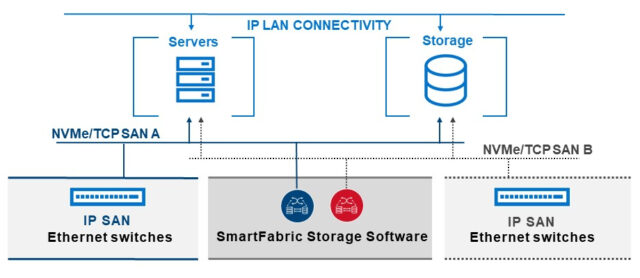Boost Your Workload Performance with NVMe/TCP
- August 30, 2022
According to ESG research, 33% of IT organizations already use NVMe-based flash storage, and another 41% are poised to deploy NVMe technology in the next 12 months.¹ These survey results reflect the need for organizations to keep up with fast-growing application environments as they scale without sacrificing performance. According to ESG Data Infrastructure Trends, organizations expect their on-premises data environment capacity to grow on average 35% annually and to double in less than three years.¹
NVMe/TCP technology comes with a slew of benefits. According to our customers, the most critical of these benefits are:
Cost savings: With NVMe/TCP technology, you can save money by leveraging an Ethernet network for a lower cost per port. Not only this, NVMe/TCP doesn’t require special RDMA Ethernet controllers (RNICs). Taking everything into consideration, an NVMe/TCP implementation is a fraction of the cost of a comparative Fibre Channel implementation.
High performance: Thanks to recent technology enhancements, NVMe/TCP provides nearly equivalent performance as Fibre channel. Furthermore, Dell Technologies PowerStore now supports up to 100GbE speeds. Compared to iSCSI, NVMe/TCP has superior performance and less complexity thanks to SmartFabric Storage Software.
For more information about NVMe/TCP and how it can help you, please visit our previous blog post.
Ecosystem: Unlike Fibre channel, NVMe/TCP’s ecosystem of vendors and comprehensive test validation was lacking. Customers needed to take on the tedious tasks and risks required to validate the hardware and software to ensure they were interoperable, limiting NVMe/TCP’s adoption.
Deployment: Even knowing all of the benefits that NVMe/TCP can provide, some customers were still hesitant to adopt it because of the complicated and manual deployment process that relied on a Direct Discovery approach, especially when considering large-scale deployments and longer distances.
To simplify and accelerate our customer’s ability to benefit from NVMe/TCP, Dell Technologies is leading the industry by providing comprehensive NVMe/TCP component validation and pursuing a standards-based approach to discovery automation. We are also providing an open-source Linux-based discovery client to simplify host deployment and connectivity maintenance. Read the solution brief to learn more.
Ecosystem validation: Dell Technologies is committed to expanding the ecosystem of validated NVMe/TCP components. Our goal is to enable organizations to adopt NVMe/TCP technology confidently. We validate the most popular hardware and software across storage, servers, Ethernet switching products and Operating systems. As with Fibre Channel, our validation work goes beyond just Dell Technologies’ product offerings. See our support matrix here for additional details.
Deployment automation: SmartFabric Storage Software (SFSS) is designed to simplify your NVMe/TCP adoption by automating manual tasks such as storage service discovery, endpoint registration, connectivity and zoning. SFSS also orchestrates NVMe/TCP fabric setup, provides discovery, naming and zone services to the SAN.
 Leading Linux-based Discovery Client Innovations
Leading Linux-based Discovery Client InnovationsIn addition, Dell is the maintainer and primary contributor to the Linux-based open-source nvme discovery client “nvme-stas”. Nvme-stas handles all aspects of discovery automation as well as connectivity maintenance and can even automate connectivity between NVMe Hosts and subsystem ports over an L3 network.
With the latest release in August 2022, we are expanding our support to more hardware and operating systems across storage, servers and networks to give you more choice and flexibility. Read the spec sheet for complete hardware and operating systems support.
Ecosystem validation: PowerMax and VxRail solutions are now included in the validated NVMe/TCP ecosystem, along with adding support for 100GbE to PowerStore. For PowerEdge, we’ve also validated SUSE Linux Enterprise Server 15 SP4, in addition to VMware ESXi 7.0U3 or later.
Automation: SFSS automation now supports PowerMax, PowerStore and VxRail solutions. For PowerEdge, SFSS also supports SUSE Linux Enterprise Server 15 SP4, in addition to VMware ESXi 7.0U3 or later.
Dell Technologies is committed to reducing the risk of adopting NVMe/TCP and making NVMe/TCP as easy as possible to deploy, allowing organizations to boost workload performance with their existing ethernet infrastructure investments. Discover how you can get started today by visiting Dell’s SmartFabric Storage Software solutions page.
¹ ESG Research Report: Data Infrastructure Trends, Nov 2021